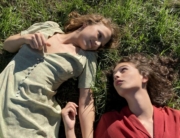We begin, more or less, with a group of elderly men drinking around a table, preparing to tell tales. There is a healthy sense of camaraderie and friendly arguments, and a few of them break into songs that are themselves stories. We have the sense that they are the keepers of old traditions, that they know of what they speak. They settle for telling the tale of Luciano, a sort of ne’er-do-well from the 19th century, though perhaps the truth of what actually happened to him is more complicated. How, they ask, are we ever to know what really is true?
This loose frame with which we begin is not merely a clever conceit, but a nod to how the film was conceived. Directors Alessio Rigo de Righi and Matteo Zoppis have returned to the method they used in their short film Belva Nera, in that they have use stories they heard from local hunters in Tuscany to form their narrative. The story of Luciano has significant gaps, which they have taken the time to fill in with their own inventions.
The result is a 90-minute film in two chapters. The first involves Luciano upon his return to the town of Vejano from Rome, where he was supposedly locked up in a madhouse. Here, the locals are discouraged from giving him alcohol (but they do not always comply). He broods, wanders, falls in love with the daughter of one of the villagers, and butts heads with the prince of the region: Luciano wants an ancient gateway to remain unlocked, as it was when he was a child, while the prince wants to keep it shut. In the second, a group of gold hunters come upon him in Argentina, where he has been exiled after a violent episode with the prince. He is pretending to be a local pastor, but he too is searching for gold, and convinces them that he has the secrets they need to find it.
The landscape, in Italy and South America, is captured in a rich, distinctive manner, often with hills and ruined buildings overpowering human figures. The actors, most of them nonprofessional, all give convincing performances, with Gabrielle Silli as the standout as Luciano. Yet for a film that hearkens back to folkloric storytelling, it is surprising how little momentum it has. One problem is the pacing. No matter what is happening, the movie takes place almost entirely at the same still, meditative pace, which, with so little variation, becomes monotonous. So much of it is watching actors in stillness and stewing on their emotions that it is easy to get lost and confused as to what their emotions are supposed to be.
One also has the sense that the writers did not delve deeply enough into the material to give the story immediacy. Certainly, there is potential—the far-flung nature of Luciano’s life is just the sort of story that would inspire filmmakers. But a few key events notwithstanding (an arson episode, a shootout), not a ton happens. Other filmmakers (the Taviani brothers, Kenji Mizoguchi, Kaneto Shindo, to name a few) have succeeded in taking the stuff of folklore and spinning it into urgent, brilliant films. Here, we are mostly left with a lot of brooding, waiting to see the lively tale the elderly men assured us was in store to take place. The two parts are also too disconnected to give Luciano’s character much continuity, and with little writing to support it, some forays into magical realism come across as forced. The film may, in fact, have benefited if it were more long-winded.














Leave A Comment